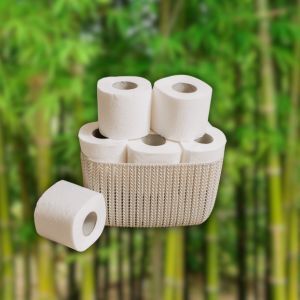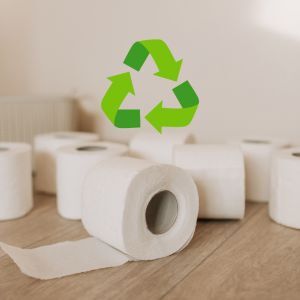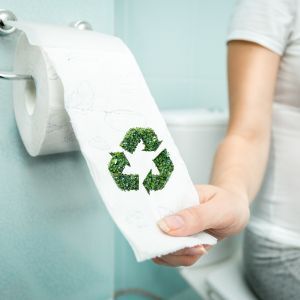How to Choose Sustainable Toilet Paper Without Sacrificing Comfort
In a world where sustainability is no longer optional, many Kiwi workplaces are asking: how can we be environmentally responsible and keep staff happy? One everyday product that’s often overlooked is toilet paper. The good news? You don’t have to trade comfort for sustainability. Here's how to choose toilet paper that ticks both boxes.
Why Sustainability Matters in the Workplace
Sustainable purchasing isn’t just for show — it’s an important part of reducing your organisation’s environmental footprint. According to the Natural Resources Defense Council (NRDC), conventional toilet paper production contributes to deforestation, particularly in Canada’s boreal forest, which stores more carbon than the Amazon.
Toilet paper made from recycled fibres or renewable resources like bamboo helps:
-
Reduce deforestation
-
Minimise landfill waste
-
Lower water and energy usage (up to 50% less than virgin pulp production)
-
Support your company’s ESG and procurement goals
To better understand how these small choices affect staff perception and morale, take a look at our related article: Do Employees Notice What Toilet Paper You Use? Why It Matters for Kiwi Workplaces. It explores how your workplace amenities, like toilet paper, can impact employee satisfaction and brand image — proving that sustainable choices can be both practical and people-focused.
What Makes Toilet Paper Sustainable?
Toilet paper is considered sustainable if it:
-
Uses 100% recycled content (post-consumer or post-industrial waste)
-
Is made from rapidly renewable resources like bamboo
-
Is FSC certified (sourced from responsibly managed forests)
-
Is free from chlorine bleach and harsh chemicals
Research from the Environmental Paper Network shows that recycled toilet paper requires 64% less energy and 74% less water to produce compared to conventional toilet paper made from virgin pulp.
Sustainable Options That Don’t Compromise Comfort
1. Bamboo Toilet Paper
-
Soft, strong and sustainable
-
Bamboo grows quickly with little water and no fertilisers
-
Feels premium while offering great breakdown in plumbing systems
2. High-Quality Recycled Toilet Paper
-
Uses post-consumer waste like office paper
-
Modern processing delivers better texture and strength than older generations
-
Usually available in bulk rolls for commercial dispensers
3. Certified Eco Toilet Paper
-
Look for FSC, PEFC, or EU EcoLabel certifications
-
These ensure responsible sourcing and minimal environmental impact
-
The FSC label guarantees no illegal logging or harmful land conversion is involved.
What to Avoid
-
Unverified bamboo products – A 2024 UK consumer report found that three of the top five bamboo brands tested contained significant amounts of non-bamboo wood pulp.
-
Low-ply recycled paper – May feel harsh and lead to higher consumption
-
Products without environmental certifications – Claims without proof offer no accountability
Tips for Commercial Buyers
-
Test a few options: Request samples before committing to bulk purchases
-
Check dispenser compatibility: Commercial settings may need jumbo or coreless rolls
-
Train cleaning staff: Proper refilling avoids waste and user frustration
-
Communicate your switch: Let staff know your toilet paper choice supports sustainability — this boosts morale and brand trust
FAQ
Q: Is bamboo toilet paper really better for the environment?
A: Yes — bamboo regenerates quickly, sequesters carbon, and requires significantly less water and fertiliser than trees. It’s often cited in scientific literature as a superior renewable resource.
Q: Does sustainable toilet paper break down well?
A: Most bamboo and high-quality recycled options are septic-safe and break down more efficiently than conventional 3-ply papers.
Q: Will I need to pay more for sustainable options?
A: While some options have a slightly higher unit price, they often require fewer sheets per use, lowering total consumption and making them more cost-efficient long-term.
Q: Can sustainable toilet paper be soft?
A: Absolutely. Modern bamboo toilet paper rivals premium virgin pulp in softness and strength, as shown in comparative reviews by Consumer NZ and other product testers.
Conclusion
Choosing sustainable toilet paper doesn’t mean sacrificing comfort. By selecting high-quality bamboo or recycled products with proven eco-certifications, your business supports climate goals, reduces waste, and provides a pleasant experience for staff and visitors alike.
Explore Insinc’s full range of eco-friendly toilet paper — perfect for New Zealand workplaces committed to sustainability without compromise.
https://www.insinc.co.nz/toiletpapervarieties.html
Posted: Wednesday 29 October 2025



